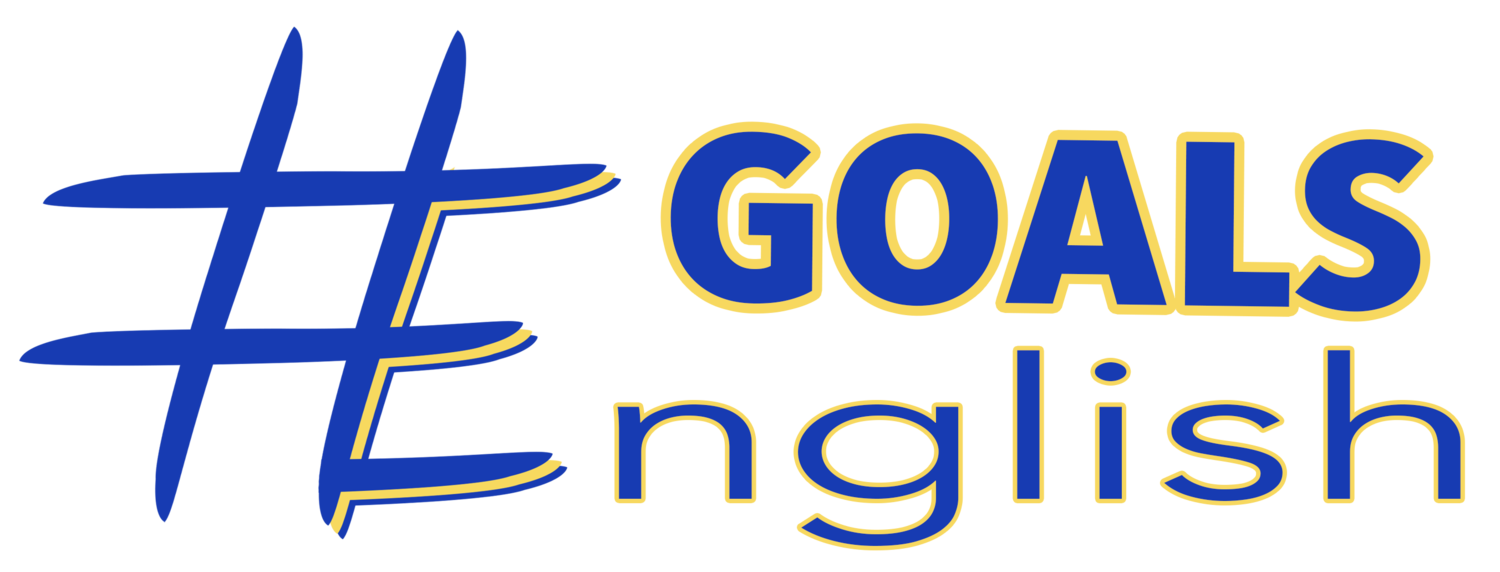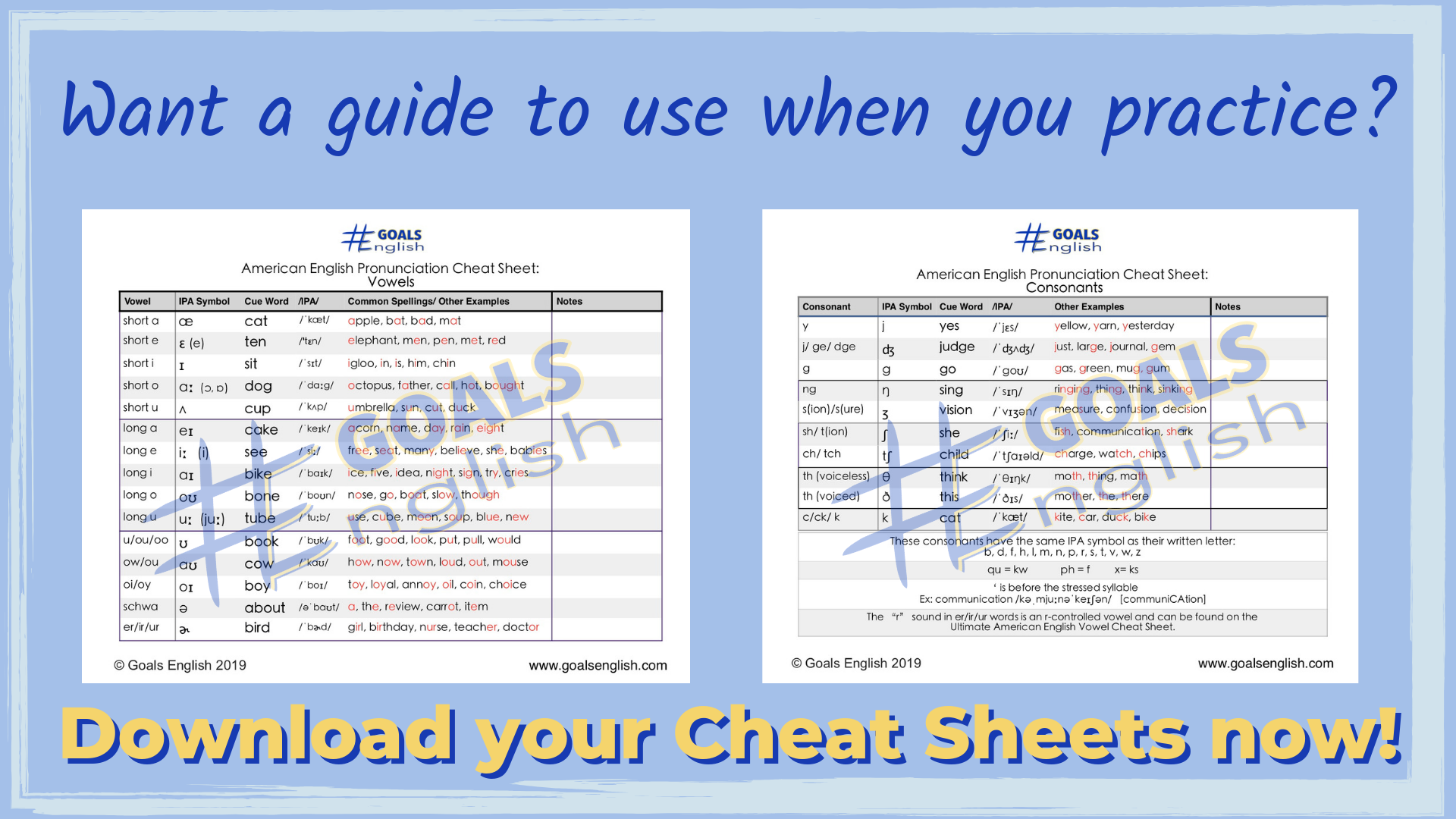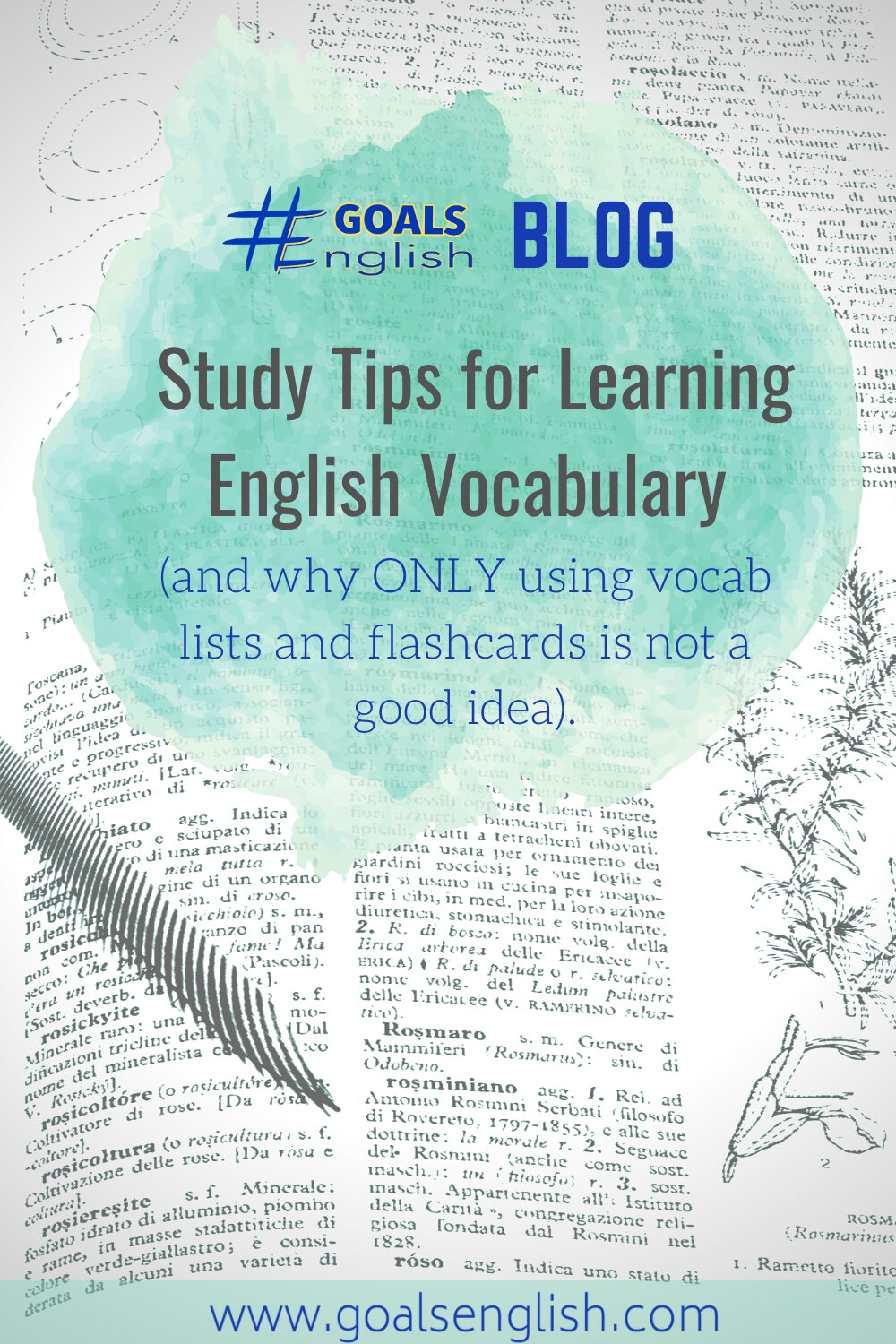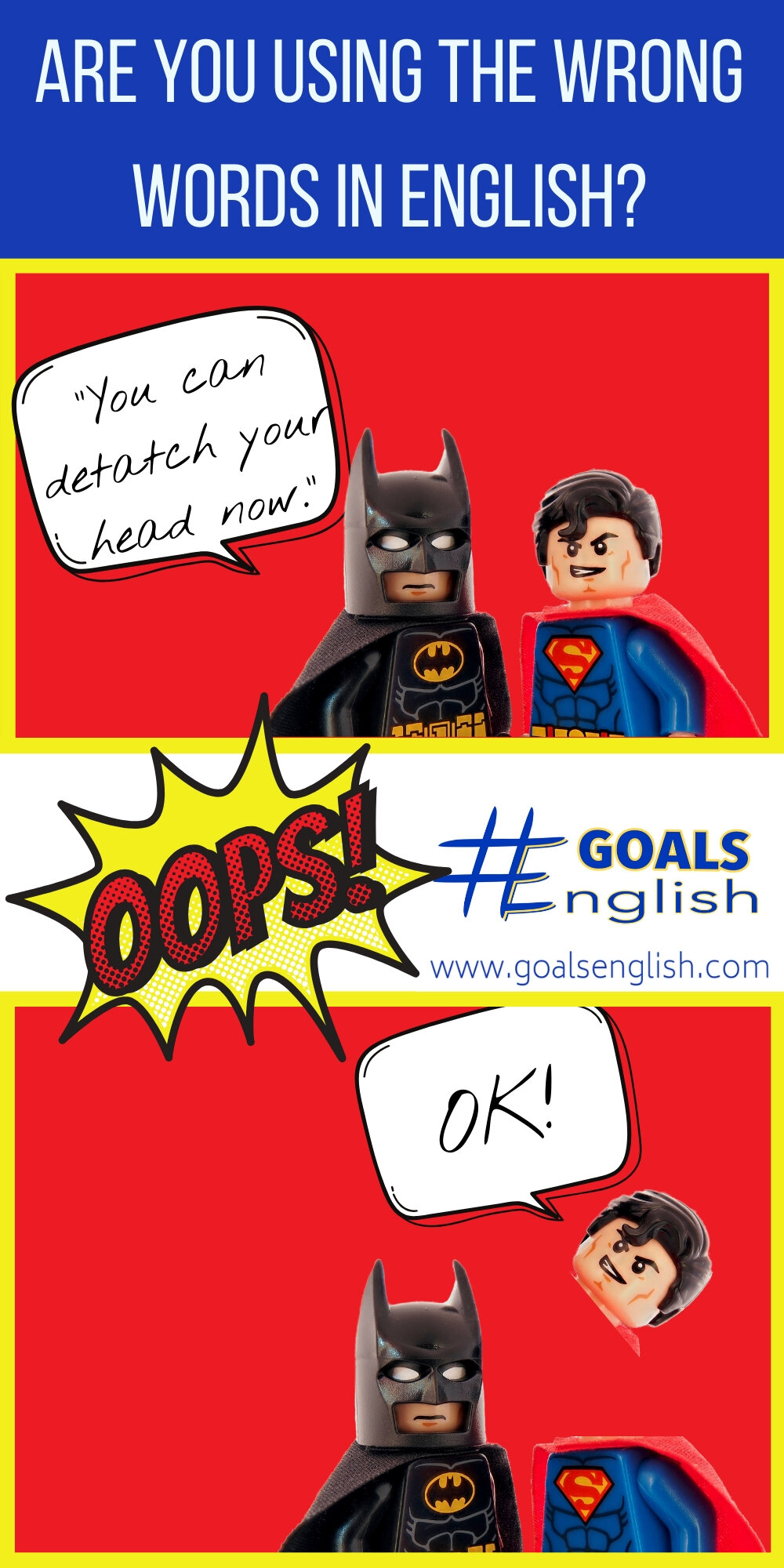Every English learner wants to expand their vocabulary! Of course! However, sometimes when learning new words, things go wrong. Students get an incomplete idea of a word’s meaning and use, and end up sounding worse at English than if they had only used simple words.
Don’t let this common mistake happen to you!
In this blog I will talk about the problem with using only lists and flash cards to learn new vocabulary words and give you study tips on better ways to study new words.
Using Vocabulary Incorrectly: A Cautionary Tale
I once had an eye doctor say to me: “You can detach your head now.”
Wow.
Wait.
I can… what?
I imagined I was a Lego character, and POP! There went my head as I detached it from my body.
If you know the correct use of the word “detach” you know that depending on the context it can have similar meanings to the words “separate” or “remove.” It implies that something is attached first, and then, you detach it.
The context was that I had my chin resting on one of his eye exam machines. He meant that I could sit up from the machine because he was finished looking at my eyes. In this situation we wouldn’t use “detach” because I wasn’t attached to the machine, I was simply resting my chin on it. Therefore, since my head wasn’t attached to anything but my body, I imagined “detaching” it from my body when he said those words!
What he should have said was “You can sit up now,” or “You can lift up your head.” Or he could have simply said something like “All done!”
In an attempt to attempt to appear more knowledgable with English, inexperienced English speakers sometimes use words that don’t fit the situation, or that wouldn’t normally be used by fluent speakers in regular speech.
Here’s a little secret: The simplest way to say something is often the best, especially when it comes to every-day situations.
Learning new words is amazing! Words have meanings that are complex and rich and help us express ourselves. There are plenty of reasons to expand your English vocabulary and learn more words. However, it may be best to save your “10 dollar words” (this is an idiom that means “big words") for deeper discussions and to always be sure you know the complete definition, connotation, and usage.
This story brings me to my main point.
The Downside of Only Learning Vocabulary from Lists and Flashcards
Lists and flashcards are great tools for keeping track of vocabulary that you have already learned. They can even be used to discover new words. But they should never be the only way you study and learn complex words. Simple words, fine. “Blue means this. Hammer means that.” No problem. Flashcards are great for very literal words like object nouns and simple adjectives and verbs.
More complex words like “mundane” or “intrigued” however… not so much. If you look at the synonyms for the word mundane, one of them is “boring.”
Example: “My job is boring.” = “My job is mundane.” That works! Cool.
How about: “She is boring.” = “She is mundane.”
Maybe. This is a tricky gray area. Technically “mundane” can be used to describe people, but it’s not very common. It is most commonly used to describe tasks or occurrences in daily life.
Last one: “I feel bored.” = “I feel mundane.”
No way! First of all, bored is an adverb while mundane is an adjective. Second of all, we can’t feel mundane. It’s just not used in this way.
Mundane has a deeper meaning relating to the “earthly world” versus “the heavens.” You will not understand this simply by reading the synonyms or the first definition of the word.
Students often learn vocabulary in list form, memorize very basic definitions, and then don’t know how to use those same words in real-world contexts.
So how can you learn new vocabulary words in English? Study Tips!
The process of learning new words, how to use them correctly, and then RETAINING what you have learned is complex. The brain needs to multiple points of connection for things to be memorable. To incorporate new words into your active vocabulary will take more than just memorizing the word and definition.
Think of learning vocabulary like a web where you need multiple sources of information to get a full picture of complex words. You especially need several example sentences written by someone who knows how to use the word correctly. How can you find these sentences?
Use Google to find sentences with your target word.
Google is such a valuable tool for language learners. I’ve even written about it before when talking about checking your grammar!
So let me show you what I mean by using Google for vocabulary studying by continuing with my example of the word “mundane.”
I type “mundane” into Google and what do I find? The first listings are different dictionary definitions of the word, many of which have sample sentences. This may not be the case with more simple words but complex words often bring up definitions, especially if you look up definitions a lot. So here are a couple sample sentences I found:
From the Cambridge dictionary: “The show was just another mundane family sitcom.”
From Vocabulary.com: "Superman hid his heroic feats by posing as his mundane alter ego, Clark Kent."
Ah! See here is an example where mundane is describing a person and it actually works well because Superman is from another planet… so he is from “beyond the earthly plain” (similar to heavenly, even though it’s not heaven). Clark Kent, on the other hand, is a man from Earth. This character or “alter ego” is mundane when compared to how amazing Superman is!
If you want to see examples that are not from a dictionary, you can switch over to the “news” tab and see the vocabulary words used in headlines.
“Even the mundane can be interesting – if you look closely.” ~The Sydney Morning Herald
“With No Sports To Call, Announcers Turn To The Mundane.” ~Gary Waleik at wbur.org
If you read the articles, you will get a fuller picture of how mundane is used in context. Which brings me to my next study tip…
Read Books, Articles, and Blogs In English and Take Notes on New Words + Add Pictures and Other Things to Help You Remember
If you are at the level that you can read fairly well in English, reading is a great way to learn new words. This is where lists come in hand can be very useful. I think reading and then making lists of new words and their definition is a great idea. (I just think you shouldn’t ONLY learn words from lists that other people have made.)
I would also recommend adding drawings and mnemonics (things to help you remember) to your list to make it even more personalized. See that? I bet you are learning new words from this post too! Mnemonics!
So why is it better to find a vocabulary word in context first? Well, when you first encounter a word in a story, for example, there is so much more to make it memorable.
I’ll show you what I mean. Let’s say you were being very ambitious and reading a some Shakespeare (reading content even native speakers struggle with!) and you read the line:
“For never was a story of more woe than this of Juliet and her Romeo.” ~William Shakespeare
So you go to your dictionary and look up the word “woe” and see that it means “great sorrow and distress.” Ah! If you had just read the word “woe” in a vocabulary list, maybe you’d read it, and the definition, and maybe you’d remember it, but chances are you were studying many words at the same time and it’s possible you’ll forget it. BUT if you learned the word “woe” in the context of Romeo and Juliet… well that’s different.
Now when you see “woe” on your vocabulary list, and maybe you drew a picture of a sword or a bottle of poison, you have the whole sad story of these two teenagers in your mind! You can think: “Oh, this is a story of ‘woe’. What a woeful story!” And it rhymes with Romeo so that also helps you with the pronunciation, long ‘o’ “woe” like “go” or “Romeo.”
Watch TV in English to Learn Idioms and Slang
Watching American TV is a great way to learn new words, especially words and phrases that are more common in casual spoken English, and less likely to be in a book or news article.
I always tell my students to watch sitcoms in English because their dialogue usually “ping-pongs” back and forth, meaning the conversations go back and forth between characters quickly. I did a whole lesson of over 20 idioms, slang words, and phrases I heard on just one episode.
It’s also easier to rewatch episodes that are funny and light-hearted so you can pick up more words with each watch. If you are able to, turn on the closed captions and rewind/pause if you hear a word that is unfamiliar so you can look it up, or write it down to ask a friend later.
Reality TV can also be a good genre to watch for slang, but be careful! Some of those shows, the people can be quite vicious (mean) so you don’t want to learn how to be rude in English!
If you have Netflix, this is even easier than ever thanks to the Chrome extension, Language Learning with Netflix which I wrote a review on here.
Speak with Other English Speakers
Sometimes you will pick up new words just from natural conversations with other English speakers. If you are every talking with someone, and a new word comes up in conversation, don’t be afraid to ask for clarification. Most people will be happy to help. Often times, native speakers especially, aren’t careful with their word choices when speaking to people that are still learning English. We often use words that are more difficult than necessary and can usually pick a different way to say something that is more simple.
Some polite ways to ask for clarification when you don’t understand a specific are:
What does “___” mean?
Sorry I didn’t understand that word, “___.” Could you explain?
I’m not familiar with “___.” What does it mean?
I think I know what “___” means, but could you tell me a little more so I can be sure?
If you don’t have anyone to practice English with in your daily life, there are apps, like Tandem, that can help you find language exchange partners. I have been using Tandem to practice Portuguese and I’m having so much fun making new friends from Brazil and exchanging not only language practice but cultural knowledge.
Find an English Teacher to Help You Build Your Vocabulary and Fluency
Of course, this list of study tips cannot be complete without mentioning learning vocabulary with a professional English teacher. If you have the time and money, studying with an English teacher is a great option.
Many students get frustrated with traditional English classes because they can often be overly focused on grammar and technical aspects of the language. Because of this, they may be hesitant to study with a teacher again. I can assure you, however, that English teachers, especially online, come in all varieties and teaching styles!
With the right amount of searching, you can find the English teacher that is perfect for you and your learning style. My classes, for example, lean towards natural vocabulary acquisition through reading while also practicing American English pronunciation and casual English conversation. This works well for some students, while others might prefer a more structured and regimented class.
If you would like to study with me, please contact me here and take a look at my one-on-one teaching page to find out more.
Also be sure to sign up for my mailing list to get lessons, updates, and your free printable charts of the IPA symbols for the sounds of American English.




